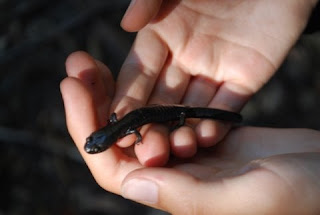Watersheds are often defined using bathtub terminology: the rim of the tub represents the highest ridges of an area, and the water flowing down its sides emblematic of waterways following gravity’s mandate and eventually reaching the “drain.” But this analogy can only go so far. If you truly want to learn about a watershed, go out and see one. And if you want to become a steward of your watershed, spend time exploring the one that you call home.
To introduce students to the Pajaro Watershed, we began in a wild area near the top of Eureka Canyon called Grizzly Flat. Outside temperatures dipped under the cooling influence of riparian vegetation and rushing water as our vehicles climbed the narrow road running parallel to Corralitos Creek. Then we walked a forested trail that led to the small, cool stream. After some exploring, students came across local residents, including newts, salamanders, and frogs. Stretching a kick net across the water revealed an abundance of aquatic invertebrates, including stoneflies, mayflies, caddis flies, and worms. Water quality tests informed us that this stream was cold, oxygen rich, and low in nitrates and phosphates—in other words, ideal for supporting a wide diversity of aquatic life.
We chose to begin our program in this beautiful location
partly because it fits nicely into a logical framework, but mostly because we
hope to combat the eco-fatigue that plagues so many students. While an
important component of Farms to Fishes
is to investigate the threats watersheds face, we wanted to ensure that
students first establish a positive connection with their environment before
diving into what’s wrong with the picture. Many young people have had limited
opportunity to develop a relationship with the natural world, and we believe
that they need a concrete sense of what they are trying to save in order to
build a strong foundation on which to build a conservation ethic.





No comments:
Post a Comment